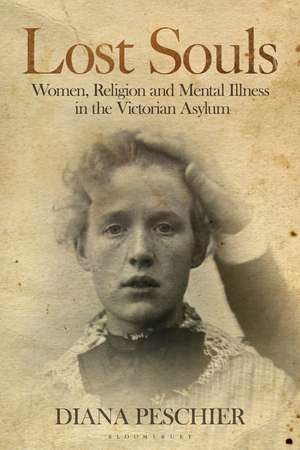Lost Souls: Women, Religion and Mental Illness in the Victorian Asylum
Autor Diana Peschieren Limba Engleză Hardback – 27 noi 2019
Preț: 657.29 lei
Preț vechi: 943.59 lei
-30% Nou
Puncte Express: 986
Preț estimativ în valută:
125.78€ • 134.49$ • 104.87£
125.78€ • 134.49$ • 104.87£
Carte tipărită la comandă
Livrare economică 18 aprilie-02 mai
Preluare comenzi: 021 569.72.76
Specificații
ISBN-13: 9781788318075
ISBN-10: 1788318072
Pagini: 224
Dimensiuni: 156 x 234 x 21 mm
Greutate: 0.54 kg
Editura: Bloomsbury Publishing
Colecția Bloomsbury Academic
Locul publicării:London, United Kingdom
ISBN-10: 1788318072
Pagini: 224
Dimensiuni: 156 x 234 x 21 mm
Greutate: 0.54 kg
Editura: Bloomsbury Publishing
Colecția Bloomsbury Academic
Locul publicării:London, United Kingdom
Caracteristici
Combines history with literature and religion
Notă biografică
Diana Peschier holds a PhD from University of London. She is the author of Nineteenth-century Anti-Catholic Discourse: The Case of Charlotte Bronte (2005)
Cuprins
Chapter One: Introduction: The Sin of Eve and Dangerous EmotionsChapter Two: Wives, Mothers and Abuse of Women in the AsylumChapter Three: Women with Religious ExcitementChapter Four: Evangelical Sunday School Teaching: Lessons for GirlsChapter Five: Physical IllnessChapter Six: Asylums and Madness Mirrored in Nineteenth-Century LiteratureChapter Seven: Male Asylum PatientsEpilogueBibliography and Sources
Recenzii
The diverse texts Peschier examines in Lost Souls compose a rich, understudied resource that will continue to yield valuable insights into religion's formative role in historical frameworks of cognitive difference in Western contexts and prehistories of what disability scholars and activists have called neurodiversity.
The book is testimony to the gendered nature of diagnosis and treatment in Victorian asylums and provides fascinating insights into the lives of the women discussed. It should inspire historians of family and community to investigate the lives of those women admitted to Victorian asylums, and provides context to their experiences.
This is a fascinating exposition of female madness and how it manifested itself in religious expression in the Victorian era. Peschier's extensive research provides us with a unique insight into the gendered treatment of these beleaguered women.
The book is testimony to the gendered nature of diagnosis and treatment in Victorian asylums and provides fascinating insights into the lives of the women discussed. It should inspire historians of family and community to investigate the lives of those women admitted to Victorian asylums, and provides context to their experiences.
This is a fascinating exposition of female madness and how it manifested itself in religious expression in the Victorian era. Peschier's extensive research provides us with a unique insight into the gendered treatment of these beleaguered women.
